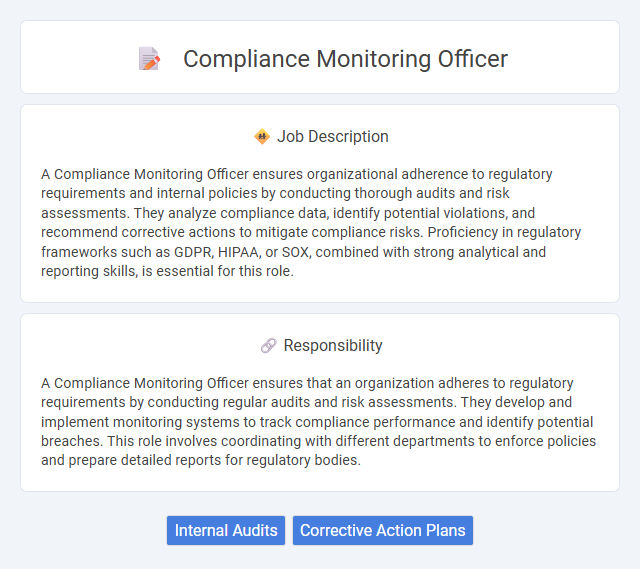
A Compliance Monitoring Officer ensures organizational adherence to regulatory requirements and internal policies by conducting thorough audits and risk assessments. They analyze compliance data, identify potential violations, and recommend corrective actions to mitigate compliance risks. Proficiency in regulatory frameworks such as GDPR, HIPAA, or SOX, combined with strong analytical and reporting skills, is essential for this role.
Individuals with strong attention to detail and a high level of integrity are likely to be suitable for the Compliance Monitoring Officer role. Those who possess excellent analytical skills and demonstrate the ability to stay calm under pressure may have a higher probability of success in this position. Candidates with a proactive mindset and strong communication skills could be well-suited to effectively identify and address regulatory risks.
Qualification
A Compliance Monitoring Officer typically requires a bachelor's degree in finance, law, or business administration, with certifications such as Certified Compliance and Ethics Professional (CCEP) highly valued. Strong knowledge of regulatory frameworks including AML, GDPR, and SOX is essential for ensuring organizational adherence to legal standards. Experience in risk assessment, audit procedures, and data analysis enhances the candidate's ability to effectively monitor compliance and mitigate potential violations.
Responsibility
A Compliance Monitoring Officer ensures that an organization adheres to regulatory requirements by conducting regular audits and risk assessments. They develop and implement monitoring systems to track compliance performance and identify potential breaches. This role involves coordinating with different departments to enforce policies and prepare detailed reports for regulatory bodies.
Benefit
A Compliance Monitoring Officer likely enhances organizational risk management by ensuring adherence to regulatory requirements and internal policies. This role may improve operational efficiency through early detection of compliance issues, minimizing legal and financial penalties. Increased trust from stakeholders and regulators could be a significant benefit, potentially leading to a stronger reputation and competitive advantage.
Challenge
A Compliance Monitoring Officer likely faces the challenge of navigating complex regulatory frameworks while ensuring organizational adherence to legal standards. Managing continuous updates to compliance policies may require a high level of adaptability and precision. It is probable that the role demands balancing thorough risk assessments with efficient operational workflows to prevent potential violations.
Career Advancement
Compliance Monitoring Officers gain valuable expertise in regulatory frameworks, risk assessment, and internal controls, which paves the way for career advancement into senior compliance roles or regulatory affairs management. Mastery of industry-specific regulations and proficiency in audit methodologies enhance opportunities to lead compliance teams or specialize in areas such as anti-money laundering and data privacy. Continuous professional development and certification, such as Certified Compliance & Ethics Professional (CCEP), significantly boost prospects for promotion to compliance director or chief compliance officer positions.
Key Terms
Internal Audits
A Compliance Monitoring Officer specializing in internal audits systematically evaluates organizational processes to ensure adherence to regulatory standards and internal policies. They design audit programs, assess risk management controls, and identify compliance gaps, enhancing operational transparency and mitigating potential violations. Expertise in data analysis and reporting enables them to provide actionable insights that support continuous improvement and regulatory compliance.
Corrective Action Plans
Compliance Monitoring Officers play a critical role in overseeing adherence to regulatory standards, ensuring that organizations implement effective Corrective Action Plans (CAPs) to address compliance violations. They analyze audit findings, identify non-compliance issues, and collaborate with stakeholders to design, track, and evaluate CAPs aimed at mitigating risks and preventing recurrence. Expertise in regulatory frameworks, risk management, and continuous improvement processes is essential for successful management of corrective actions and sustaining regulatory compliance.
 kuljobs.com
kuljobs.com